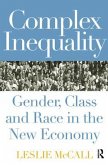The decreasing capacity to govern complex social processes results in negative trends that breach system thresholds in all main social domains with extreme economic stratification of society. Independent studies steadily report that a strong majority of the world's population, between 60% and 80%, already feels excluded and no longer represented by their governments. The two prevailing concepts of complexity seem to overlook the central importance of mesoscopic complexity. Socially complex conditions call for a new kind of social thought specifically developed for a blinded generation that must be as different from modern and postmodern thoughts, as they were different from their middle-age precedents. 'Complex Society: In the Middle of a Middle World', addresses the concerns of the excluded majority by explaining how present complex social conditions work in favor of generational aspirations to achieve a more positive future. In the geometry of thinking, a complex matter is not comprehensible objectively, but only by evaluating overlaps between complexity domains on their periphery, which is in the area of their inconsistencies. The book first develops an evaluative methodology for studying complex social matters and then tests it with three case studies that reflect some of the most pressing problems in contemporary societies: aggregation problem, integration problem, and organization problem. The obtained findings give grounds for the depiction of an outline for the 'anti-postmodern' ordering of contemporary societies. This ground-breaking text will be of particular interest for graduate and post-graduate level of social sciences, evaluators of project, program and policy impact evaluation, evaluators of philosophy of science, as well as methodologists of social research and public governance.
Hinweis: Dieser Artikel kann nur an eine deutsche Lieferadresse ausgeliefert werden.
Hinweis: Dieser Artikel kann nur an eine deutsche Lieferadresse ausgeliefert werden.








